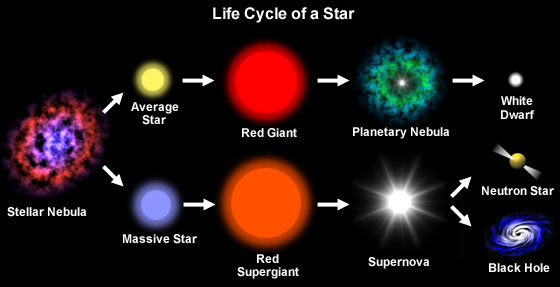information a weather map provides
show temperature, pressure systems (highs and lows), wind direction and speed, humidity levels, and precipitation.
atomic number tells how many
protons AND electrons are in an element
the change of energy from the sun to a plant
light to chemical
how long the lunar cycle is
29.5 days
where all stars form
a nebula
weather a cold front brings
rain, hail,sometimes thunder and lightning; stormy cold weather
Mass number tells how many
protons AND neutrons are in an element
the change of energy from food to riding your bike
chemical to motion/mechanical
the format the sun,earth, and moon are in when a lunar eclipse happens
sun,earth,moon
how long a star lives depends on
its mass
weather a warm front brings
Humid; warm temperature
atoms during a chemical change
The atoms are rearranged to make new substances with different properties.
newtons three laws
(1) Every object moves in a straight line unless acted upon by a force. (2) The acceleration of an object is directly proportional to the net force exerted and inversely proportional to the object's mass. (3) For every action, there is an equal and opposite reaction.
the side that is lit by the moon on the first quarter ( the sun is on the left)
right
favorite planet
saturn/earth
(no im not hearing anybody out on other planets, saturn/earth was the only right choice.)
weather an occluded front brings
strong winds; high precipitation
how atoms can gain, lose, or share electrons during a chemical change
Atoms can gain,lose, or share electrons during a chemical change because when a chemical reaction happens, the atoms attempt to stabilize one another and make each other.
The change of energy from a generator to a light bulb
chemical to mechanical
the different moon phases in order
new moon, waxing crescent, first quarter, waxing gibbous, full moon, waning gibbous, last quarter, waning crescent.
the planets in order starting from the sun (this should be free points)
Mercury, Venus, Earth, Mars, Jupiter, Saturn, Uranus, and Neptune.
you're an op if you counted pluto
weather an stationary front brings
cloudy; snow and rain
the differences between the 3 different types of atom models
The electron cloud model shows how electrons are found in a region around the nucleus, The Bohr model does not show the true arrangement of electrons in the atom or the physical location in the atom, and in the space-filling model, atoms are represented as solid spheres. The spheres do not show the parts that make up the atoms.
Draw out the velocity triangle
D is on top, V and T on bottom
difference between neap tide and spring tide (could be format or what they bring)
spring tides occur when the sun, moon, and Earth are lined up, and this causes regular high tides and low tides to be much higher. Neap tides occur when the sun, moon, and Earth form a right angle, and this causes the regular high tides and low tides to become much lower than usual.
the life cycle of an average star (from start to finish)
nebula, star, red giant, planetary nebula, white dwarf